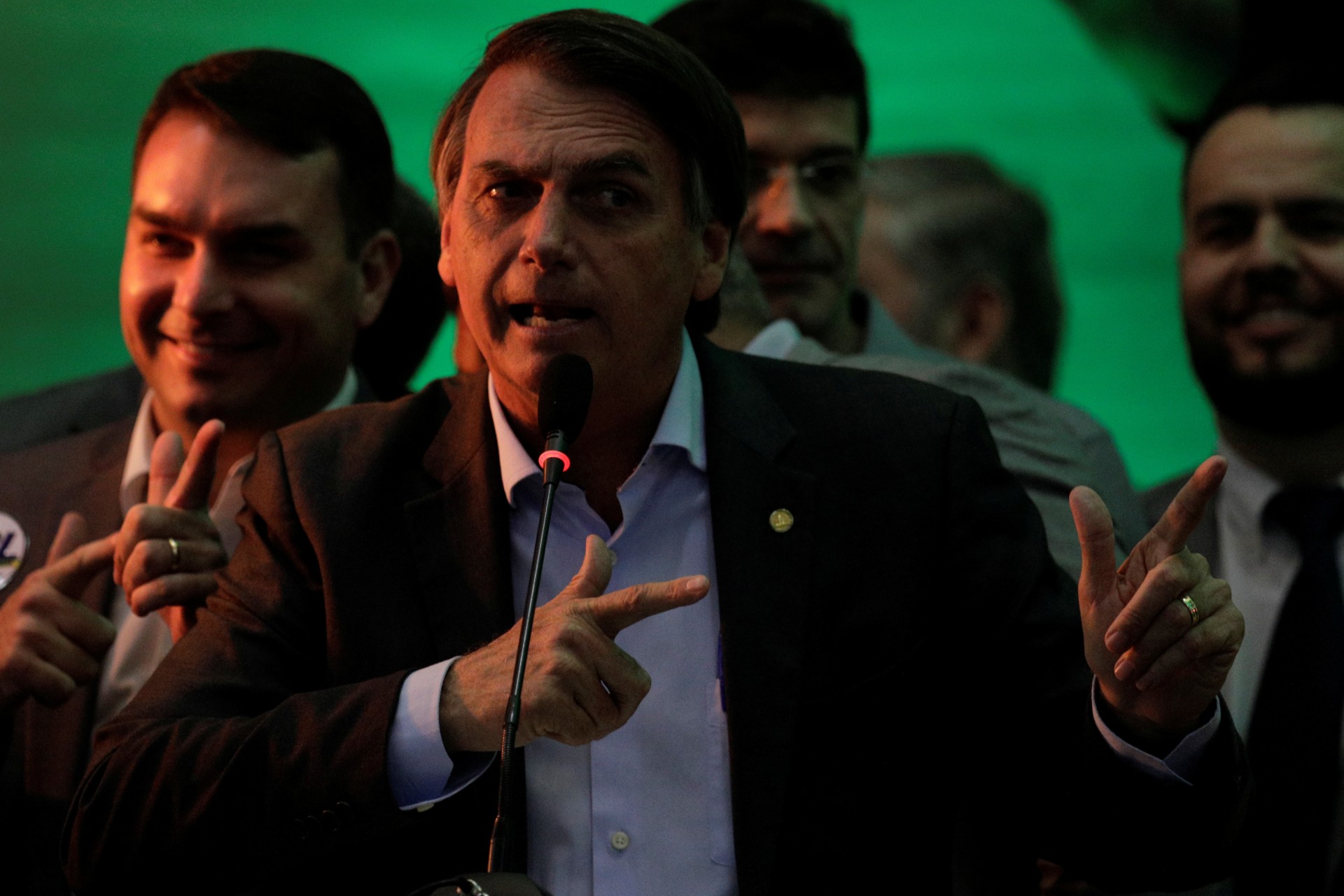Bolsonaro Ascendant: The Similarities to Rodrigo Duterte

By experts and staff
- Published
Experts
![]() By Joshua KurlantzickSenior Fellow for Southeast Asia and South Asia
By Joshua KurlantzickSenior Fellow for Southeast Asia and South Asia
On Sunday, far-right Brazilian presidential candidate Jair Bolsonaro outperformed polls and won roughly 46 percent of the vote in the first round of Brazil’s presidential elections, coming close to the 50 percent threshold that would have given him the victory outright. He will now face the second place finisher, Workers Party candidate Fernando Haddad, in a run-off in three weeks, one in which Bolsonaro will be heavily favored to win.
Without a doubt, autocratic-leaning populism has made enormous strides globally in the past decade, in Hungary, Poland, and Turkey, among other places, and right-leaning populists also have gained power in North America and Western Europe as well. But in many respects Bolsonaro most closely resembles a Southeast Asian populist, Rodrigo Duterte, even though the two men theoretically have different political ideologies. Duterte has always said that he came from a leftist political background—and indeed Duterte has passed some progressive policies in office, albeit while simultaneously undermining democratic institutions and norms—while Bolsonaro is an unabashed political conservative.
For one, both men have appealed to citizens with promises of extreme responses to crime and corruption—Duterte’s war on drugs, for instance, which has involved condoning widespread extrajudicial killings of drug traffickers, drug users, and many people additionally who had no links to drugs at all. In Brazil, where the murder rate has reached a new high, Bolsonaro has promised to give the Brazilian police, already some of the most militarized in South America, wider rein to shoot at suspects, and has at least hinted at approving Duterte-style extrajudicial killings. He also has waxed nostalgic about Brazil’s years of dictatorship, and has suggested he would pack his cabinet with military men.
Both also have taken advantage of the weaknesses, in-fighting, and graft of existing political parties, positioning themselves as outsiders who can bring radical change in a country where elites have lost the public trust, and where publics have soured on democracy itself, feeling that it has led to a lack of public security, has not addressed inequality, and has offered up politicians largely disconnected from many voters. In the Philippines, despite strong growth during the presidency of Duterte’s predecessor, Benigno Aquino III, and rising investment in the Philippines, inequality remained high, and Aquino was perceived by many voters as aloof. State institutions remained fragile or nonexistent, infuriating working class and middle class Filipinos. Meanwhile, in the months before Duterte was elected in 2016, other presidential candidates continued to fight each other rather than build an alliance against Duterte, who was elected in a multicandidate race where no one received 50 percent of the popular vote.
Bolsonaro, meanwhile, has risen in the wake of massive corruption scandals involving prominent figures from both the Workers Party and other parties, including former president Luiz Inacio Lula da Silva, who was the front-runner in this presidential campaign until he was jailed. Bolsonaro has positioned himself as a scourge of corruption, as a strongman who can solve deep and entrenched problems—though it is unclear whether he himself was totally clean in the past. He also has benefitted from Brazil’s severe economic decline in recent years, which has led to a spike in unemployment and fed a popular desire for any political alternative that can right the Brazilian economy. Like Duterte, Bolsonaro has benefitted from the adept use of social media, which allowed both men, as candidates, to amplify their messages and also sidestep the mainstream media.
More than leaders in places like Poland and Hungary, too, Bolsonaro and Duterte thrive on brutal and misogynistic rhetoric, such as jokes about rape. They further utilize outlandish, insulting, crude remarks to shock the political system and political norms—a typical tactic of autocratic-leaning populists—test what actions they can get away with, and, not coincidentally, draw a continuous stream of media attention.
A final lesson, too, to take from the Duterte era in the Philippines is that autocratic-leaning populists, such as Duterte, may make seemingly outlandish statements and promises on the campaign trail—but that voters should believe that these populists intend to at least attempt to carry out their plans. As mayor of Davao, Duterte allegedly oversaw widespread extrajudicial killings as a supposed means to combat crime, and on the campaign trail he essentially promised the war on drugs that he has overseen. Yet some analysts—and perhaps some voters too—played down Duterte’s seemingly extreme promises; but, in office, he has followed through on the drug war, and also on other campaign pledges.
